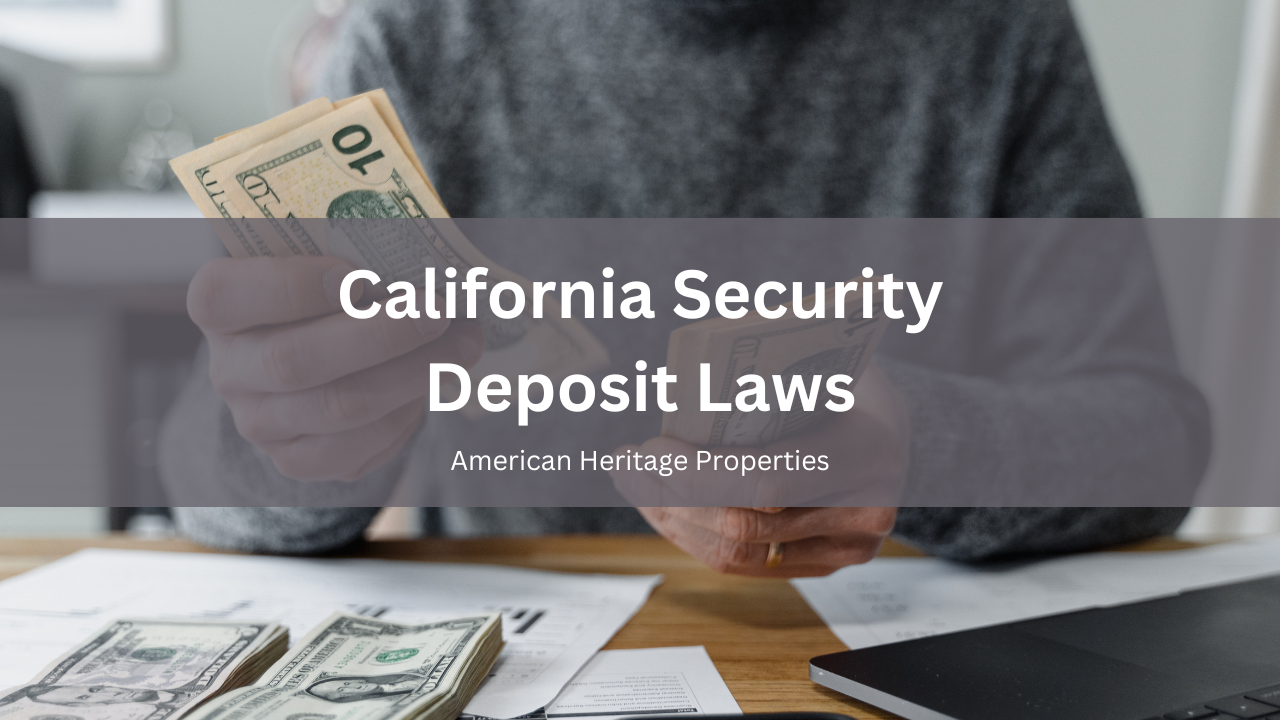California Security Deposit Laws

Are you a landlord or looking to invest in California and need guidance navigating its security deposit regulations? Understanding security deposits can be confusing. Thankfully, American Heritage Properties is here to simplify things! This is a guide for outlining the complexities of California security deposit laws, making it easier than ever to manage your rentals.
We cover everything from security deposit limits and allowable deductions to the return process following an
eviction or lease termination, ensuring that, as a property owner, you stay compliant and avoid misunderstandings with renters. Read on to find out more about how to navigate the legal aspects of security deposits.
Understanding California Security Deposit Limits
In California, the law restricts the amount landlords can charge for security deposits. For unfurnished residential rental properties, the maximum security deposit is equivalent to two months' rent. For furnished residential rental properties, the limit is three months' rent. This cap includes any money for pet deposits.
A new law in 2024 limits the security deposit to one month’s rent for any California property owner or landlord that has more than two residential rental properties.
Landlords should be mindful of these limits to avoid legal issues and ensure a good landlord-tenant relationship.
It's essential to clearly
communicate this limit to prospective tenants to set proper expectations and maintain transparency from the outset.
Clarifying Nonrefundable Fees
California law prohibits nonrefundable fees. As such, your security deposit collection practices need to adhere to local laws. Any money collected from a tenant must be refundable and part of the security deposit fees, which is returned at the end of the tenancy, minus any legitimate deductions.

These security deposit laws helps protect tenants from unfair charges and ensures landlords only charge what is necessary and reasonable. Clearly communicating this to a tenant can prevent misunderstandings and disputes later on, maintaining a great relationship.
Proper Holding of a Tenant’s Security Deposit in California
Under California security deposit law, landlords are not required to keep security deposits in a separate account, but they must handle them responsibly. It's advisable to keep these funds separately to avoid mixing it in with personal finances, ensuring that the security deposit is readily available when the tenancy ends.
Proper documentation and accounting practices can help landlords in California track the security deposit and any deductions, providing transparency and avoiding potential legal issues.
Providing Written Notice After Receiving a Security Deposit
Once a landlord receives a security deposit, they should provide the tenant with a written receipt, although it's not legally required under California law. This receipt should detail the amount received and the purpose of the security deposit. Providing this notice builds trust and transparency with a tenant, ensuring they are aware of the security deposit's status. It also serves as a record for both parties, which can be useful in case of disputes.
Legitimate Reasons to Withhold a Tenant’s Security Deposit
Under California law, landlords can withhold part or all of a tenant’s security deposit for specific reasons. The security deposit can be used to cover unpaid rent, damage beyond normal wear and tear, and cleaning costs to return the rental unit to its original condition.

Detailed itemization of deductions must be provided to the tenant within 21 days after they move out. Should the deductions exceed $125.00, the landlord in California is required to include copies of invoices or receipts along with the itemized statement.
This transparency helps California landlords in avoiding conflicts and ensures that deductions are fair and justified, maintaining a professional relationship with tenants.
Conducting a Walk-Through Inspection in Califorina
A walk-through inspection allows landlords and tenants to assess the property's condition before moving out. California law requires landlords to offer this inspection two weeks prior to the move-out date.
This inspection helps identify potential issues and gives tenants a chance to address them before vacating, which can minimize disputes over security deposit deductions. Documenting the inspection with photos and written notes can further ensure clarity and fairness, thus preventing disputes between landlords and tenants.
Landlords also must provide their tenant with a 48 hour written notice before they enter the California rental unit and carry out the inspection.
Process of Security Deposit Refunds in Califorina
In California, landlords must return the remaining security deposit within 21 days after the tenant moves out, along with an itemized list of any deductions.
Failure to do so can result in legal penalties. Providing a detailed account of deductions and maintaining open communication with the tenant can help avoid misunderstandings.
Making sure the refund is timely and accurate reflects positively on the landlord’s professionalism and respect for the tenant's rights.
Managing Security Deposits During Property Ownership Changes
When a California rental unit changes ownership, the old property owner must transfer the security deposits to the new landlord or return them to the tenants. This transfer should include an itemized statement of any deductions made during their tenancy.

The new owner must then notify tenants of the transfer and their new contact details. Proper handling during ownership changes ensures tenants' security deposits are protected and legal obligations are met, preventing potential disputes and maintaining trust.
Conclusion
Understanding and complying with the California security deposit laws is essential for any landlord. By adhering to these guidelines, landlords can protect their investment, foster positive tenant relationships, and avoid potential legal issues.
Make sure to check your local and county ordinances, as there may be additional regulations to follow. Managing these details can be time-consuming and complex, but you don't have to do it alone. Hiring a property management company can provide peace of mind and professional handling of all aspects of property management. Consider partnering with
American Heritage Properties.
Our expertise and dedication to excellence can help you navigate the intricacies of rental property management, saving you time, money and stress. Contact our property managers today to learn more about our California property management services!
Disclaimer: This blog should not be used as a substitute for legal advice from a licensed attorney in your state. Laws frequently change, and this post might not be updated at the time of your reading. Please contact us for any questions you have in regards to this content or any other aspect of your property management needs.









